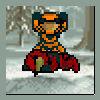-
Posts
28 -
Joined
-
Last visited
Reputation Activity
-
 Aurenian got a reaction from Ryoko_Takahashi in What are skills? and how do they work?
Aurenian got a reaction from Ryoko_Takahashi in What are skills? and how do they work?
Basically the crux of my problem with having a more traditional skill path in a game like this is that its a relic of older games that don't simulate things to the degree that Dual Universe will.
It seems like they want to lock technologies behind the skill trees so that everyone can't do everything at once. But I think the nature of the infrastructure needed for advanced technology and space flight will be enough of a barrier in of itself.
In Space Engineers for example you technically have the ability to build a jump capable spaceship as soon as you spawn. Except that you're on a planet, with very little refined minerals to hand. And you need a significant mining operation. And a lot of rare elements that take ages to refine. And the rarest elements for the best engines can only be found in space. So you have a long path ahead of you before you can even dream or making that first jump.
And that's without contending with potentially thousands of other players and their organisations.
As for skill specialisations. I don't think that handing out skill based stat bonuses is the way to go. You don't become the best fleet admiral in the verse because you have a leadership bonus +5. You get there through experience leading fleets of other players into battle. You don't need an arbitrary number to tell you because you are doing it yourself.
Likewise tech specialists, artists, and engineers will arise naturally if the crafting system is deep enough to allow for it.
For combat specialisation I think in a sci fi game your special abilities are better defined by your equipment. How well you fight (and the gods of ping) will be the real measure of how good you are in a fight.
Honestly this is what I think you need on your character sheet for a game like this:
Page 1
Bio (name, appearance, backstory etc
Page 2
Assets (money, controlled organisation ships/stations etc)
Page 3
Status (organisations, granted tiles etc)
Page 4
Contracts (buy/sell orders, jobs, alliances etc)
When we hand build everything, negotiate with other real people, and fight with our own reflexes, that's all we need.
I'm interested to see what the devs say on the matter when they blog about progression in more depth.
-
 Aurenian got a reaction from lethak in What are skills? and how do they work?
Aurenian got a reaction from lethak in What are skills? and how do they work?
Basically the crux of my problem with having a more traditional skill path in a game like this is that its a relic of older games that don't simulate things to the degree that Dual Universe will.
It seems like they want to lock technologies behind the skill trees so that everyone can't do everything at once. But I think the nature of the infrastructure needed for advanced technology and space flight will be enough of a barrier in of itself.
In Space Engineers for example you technically have the ability to build a jump capable spaceship as soon as you spawn. Except that you're on a planet, with very little refined minerals to hand. And you need a significant mining operation. And a lot of rare elements that take ages to refine. And the rarest elements for the best engines can only be found in space. So you have a long path ahead of you before you can even dream or making that first jump.
And that's without contending with potentially thousands of other players and their organisations.
As for skill specialisations. I don't think that handing out skill based stat bonuses is the way to go. You don't become the best fleet admiral in the verse because you have a leadership bonus +5. You get there through experience leading fleets of other players into battle. You don't need an arbitrary number to tell you because you are doing it yourself.
Likewise tech specialists, artists, and engineers will arise naturally if the crafting system is deep enough to allow for it.
For combat specialisation I think in a sci fi game your special abilities are better defined by your equipment. How well you fight (and the gods of ping) will be the real measure of how good you are in a fight.
Honestly this is what I think you need on your character sheet for a game like this:
Page 1
Bio (name, appearance, backstory etc
Page 2
Assets (money, controlled organisation ships/stations etc)
Page 3
Status (organisations, granted tiles etc)
Page 4
Contracts (buy/sell orders, jobs, alliances etc)
When we hand build everything, negotiate with other real people, and fight with our own reflexes, that's all we need.
I'm interested to see what the devs say on the matter when they blog about progression in more depth.
-
 Aurenian reacted to Thoger in What are skills? and how do they work?
Aurenian reacted to Thoger in What are skills? and how do they work?
It has been said a thousand times that you don't need skill trees to specialize. Just put interesting, demanding game mechanics in place for the different activities in the game and people will specialize by practising the things they like most instead of emulating practice through a skill tree.
-
 Aurenian got a reaction from Thoger in What are skills? and how do they work?
Aurenian got a reaction from Thoger in What are skills? and how do they work?
From what I saw of it the main skills in eve were learning how to fly, manage people, and work as a team. The training trees got in the way of actually playing the game.
-
 Aurenian got a reaction from Thoger in Tech Research
Aurenian got a reaction from Thoger in Tech Research
To me, any system which places artificial walls in front of player progression should be avoided. So tech trees based on timed unlocks, or grinding meaningless activities are out.
There seems to be this underlying idea that letting players have access to the whole tech tree at launch is a bad thing for some reason. But I think Knowing which pieces we need to build a rocket is not the same as successfully launching a mission to space.
In a building game like this the true progression is the infrastructure you build to support your projects. It's the difference between mining every block by hand in Minecraft and creating a gigantic ship in Space Engineers that eats asteroids whole and 3D prints space stations.
In a Massively Multiplayer game creating and/or gaining access to the infrastructure you need for space travel and exploration will be a huge undertaking in its own right just because of competition with other players and factions. Forcing everyone to go through the tree punching stage isn't going to improve the experience in my opinion.
I think a better way to simulate technological progression is to increase the complexity of the crafting system at the fundamental level. Instead of building ships out of engines, cockpits, and reactors, plus voxels, build ships out of machine parts combined in different ways. Players will experiment to find the ways the parts work for the constructions they want, and specialisations and knowledge will arise naturally.
I've explained it in more detail here:
https://board.dualthegame.com/index.php?/topic/833-component-elements-building-with-smaller-parts/
-
 Aurenian got a reaction from Thoger in Component elements (building with smaller parts)
Aurenian got a reaction from Thoger in Component elements (building with smaller parts)
From the info we have so far it looks like we'll have a set of skill trees that determine tech level and a set of basic pre determined elements to combine into ships and stations.
Maybe there will be ways to get higher tech elements of the same type through research? I remember someone saying something about levels of weapons in an interview but there isn't much to go on yet.
Personally I'm in favour of making the crafting system more sophisticated so that specialisations arise naturally among the player base instead of through arbitrary skill allocation. This strikes me as the sort of game where progression through player skill would be a better fit.
To that end I propose that the pre built functional elements be smaller components with set properties instead of full parts.
So for instance instead of just throwing on a single engine block that takes up a large amount of space you would build an engine out of smaller parts stuck together that function as an engine.
To build a basic engine that works you'd only need a handful of parts. Say an ignition block, propulsion unit, stabilizer, vector cone and control unit.
But you could add more parts to increase it's performance in different ways, with the better ones made of rarer elements. Each component would add weight and energy/fuel requirements. Some might also need a certain amount of space around them to function correctly(eg heat sinks) or have interference with other more sensitive parts. After you'd built the guts of the engine you would then use standard voxel tools to give it a casing and incorporate it into the ship.
And this would be the case with every part that creates function. A cockpit would be a pilots seat(with control surface), computer, life support monitor, oxygen tank, heating element, hinged canopy etc. Extra parts could be holographic projector, rangefinder etc.
Some common parts would be found in multiple devices (like power cells) whereas others would be specialised to certain devices (matter transmitter coils).
Each part would have multiple connection points so that they can be configured in various ways. The game would have a master list of devices and when the minimum number of parts are connected together via their ports for a particular device it would treat them as that thing when powered up. Or alternately you might include a way for the player to tell the computer which device they are building (perhaps by including a control chip in every device)
Technologies that the devs want to be harder to master (like FTL) could have a significantly larger number of more sensitive parts. And they could not include a standard template if they wanted to make it take real research.
The end result of this is that as well as ships and stations players could also become experts at creating ship parts and the complexity of the interactions would create genuine expertise in the player base. When your organisation's engineer tells you the reactor can't take it anymore it's because she designed it. When the ship takes damage, you would replace the destroyed components in a device to get it functioning again.
At launch the developers would have a no frills version of each device blueprinted up for each player to start off with so they don't have to become an expert just to begin building. The players who are interested in that side of things would experiment with all kinds of configurations. Later on people would buy device plans off the market if they want to build their own ship without starting from scratch.
You could create the coolest looking hyperdrive on the market. Or the cheapest. or the most powerful. And you could create your brand for advertising.
The other benefit of this system is that you don't need weapon tiers or constant injections of tech from the devs. Make up a list of weapon and defence types that are interesting, with their own strengths and weaknesses. Break them into bits that make sense, with lower tech weapons like projectiles requiring less exotic materials for their components. Then let the players experiment with what you give them.
I guarantee you a Blastcorp Annihilator Cannon is way cooler than a tech three plasma cannon.
Just my thoughts.
-
 Aurenian got a reaction from Antioch in Component elements (building with smaller parts)
Aurenian got a reaction from Antioch in Component elements (building with smaller parts)
From the info we have so far it looks like we'll have a set of skill trees that determine tech level and a set of basic pre determined elements to combine into ships and stations.
Maybe there will be ways to get higher tech elements of the same type through research? I remember someone saying something about levels of weapons in an interview but there isn't much to go on yet.
Personally I'm in favour of making the crafting system more sophisticated so that specialisations arise naturally among the player base instead of through arbitrary skill allocation. This strikes me as the sort of game where progression through player skill would be a better fit.
To that end I propose that the pre built functional elements be smaller components with set properties instead of full parts.
So for instance instead of just throwing on a single engine block that takes up a large amount of space you would build an engine out of smaller parts stuck together that function as an engine.
To build a basic engine that works you'd only need a handful of parts. Say an ignition block, propulsion unit, stabilizer, vector cone and control unit.
But you could add more parts to increase it's performance in different ways, with the better ones made of rarer elements. Each component would add weight and energy/fuel requirements. Some might also need a certain amount of space around them to function correctly(eg heat sinks) or have interference with other more sensitive parts. After you'd built the guts of the engine you would then use standard voxel tools to give it a casing and incorporate it into the ship.
And this would be the case with every part that creates function. A cockpit would be a pilots seat(with control surface), computer, life support monitor, oxygen tank, heating element, hinged canopy etc. Extra parts could be holographic projector, rangefinder etc.
Some common parts would be found in multiple devices (like power cells) whereas others would be specialised to certain devices (matter transmitter coils).
Each part would have multiple connection points so that they can be configured in various ways. The game would have a master list of devices and when the minimum number of parts are connected together via their ports for a particular device it would treat them as that thing when powered up. Or alternately you might include a way for the player to tell the computer which device they are building (perhaps by including a control chip in every device)
Technologies that the devs want to be harder to master (like FTL) could have a significantly larger number of more sensitive parts. And they could not include a standard template if they wanted to make it take real research.
The end result of this is that as well as ships and stations players could also become experts at creating ship parts and the complexity of the interactions would create genuine expertise in the player base. When your organisation's engineer tells you the reactor can't take it anymore it's because she designed it. When the ship takes damage, you would replace the destroyed components in a device to get it functioning again.
At launch the developers would have a no frills version of each device blueprinted up for each player to start off with so they don't have to become an expert just to begin building. The players who are interested in that side of things would experiment with all kinds of configurations. Later on people would buy device plans off the market if they want to build their own ship without starting from scratch.
You could create the coolest looking hyperdrive on the market. Or the cheapest. or the most powerful. And you could create your brand for advertising.
The other benefit of this system is that you don't need weapon tiers or constant injections of tech from the devs. Make up a list of weapon and defence types that are interesting, with their own strengths and weaknesses. Break them into bits that make sense, with lower tech weapons like projectiles requiring less exotic materials for their components. Then let the players experiment with what you give them.
I guarantee you a Blastcorp Annihilator Cannon is way cooler than a tech three plasma cannon.
Just my thoughts.
-
 Aurenian got a reaction from croxis in Tech Research
Aurenian got a reaction from croxis in Tech Research
But you can't be everything at once. Because while you're busy trying to be an empire of one, an organisation of thousands is stripping asteroid belts wholesale and turning them into warships and battle tanks to come and mess up your pitiful little tent city on the frontier.
The point of an MMO is to play with a crap ton of other people. Progress in something like EVE is not measured in skill points but in how many people know your name.
leveling is superfluous if the systems built into the gameplay are sufficiently complex.
-
 Aurenian got a reaction from nietoperek in Component elements (building with smaller parts)
Aurenian got a reaction from nietoperek in Component elements (building with smaller parts)
From the info we have so far it looks like we'll have a set of skill trees that determine tech level and a set of basic pre determined elements to combine into ships and stations.
Maybe there will be ways to get higher tech elements of the same type through research? I remember someone saying something about levels of weapons in an interview but there isn't much to go on yet.
Personally I'm in favour of making the crafting system more sophisticated so that specialisations arise naturally among the player base instead of through arbitrary skill allocation. This strikes me as the sort of game where progression through player skill would be a better fit.
To that end I propose that the pre built functional elements be smaller components with set properties instead of full parts.
So for instance instead of just throwing on a single engine block that takes up a large amount of space you would build an engine out of smaller parts stuck together that function as an engine.
To build a basic engine that works you'd only need a handful of parts. Say an ignition block, propulsion unit, stabilizer, vector cone and control unit.
But you could add more parts to increase it's performance in different ways, with the better ones made of rarer elements. Each component would add weight and energy/fuel requirements. Some might also need a certain amount of space around them to function correctly(eg heat sinks) or have interference with other more sensitive parts. After you'd built the guts of the engine you would then use standard voxel tools to give it a casing and incorporate it into the ship.
And this would be the case with every part that creates function. A cockpit would be a pilots seat(with control surface), computer, life support monitor, oxygen tank, heating element, hinged canopy etc. Extra parts could be holographic projector, rangefinder etc.
Some common parts would be found in multiple devices (like power cells) whereas others would be specialised to certain devices (matter transmitter coils).
Each part would have multiple connection points so that they can be configured in various ways. The game would have a master list of devices and when the minimum number of parts are connected together via their ports for a particular device it would treat them as that thing when powered up. Or alternately you might include a way for the player to tell the computer which device they are building (perhaps by including a control chip in every device)
Technologies that the devs want to be harder to master (like FTL) could have a significantly larger number of more sensitive parts. And they could not include a standard template if they wanted to make it take real research.
The end result of this is that as well as ships and stations players could also become experts at creating ship parts and the complexity of the interactions would create genuine expertise in the player base. When your organisation's engineer tells you the reactor can't take it anymore it's because she designed it. When the ship takes damage, you would replace the destroyed components in a device to get it functioning again.
At launch the developers would have a no frills version of each device blueprinted up for each player to start off with so they don't have to become an expert just to begin building. The players who are interested in that side of things would experiment with all kinds of configurations. Later on people would buy device plans off the market if they want to build their own ship without starting from scratch.
You could create the coolest looking hyperdrive on the market. Or the cheapest. or the most powerful. And you could create your brand for advertising.
The other benefit of this system is that you don't need weapon tiers or constant injections of tech from the devs. Make up a list of weapon and defence types that are interesting, with their own strengths and weaknesses. Break them into bits that make sense, with lower tech weapons like projectiles requiring less exotic materials for their components. Then let the players experiment with what you give them.
I guarantee you a Blastcorp Annihilator Cannon is way cooler than a tech three plasma cannon.
Just my thoughts.
-
 Aurenian got a reaction from Pantydraco in What are skills? and how do they work?
Aurenian got a reaction from Pantydraco in What are skills? and how do they work?
My point is that if they make the various systems in the game more complex than a standard MMO, then specializations will emerge naturally in the player base. Thus rendering a standard skill system obsolete.
Take your sniper example. If the game's idea of ranged combat is just 'point the shooty end at the enemy' then everyone could be a sniper. But if they make shooting a bit more complex by giving different guns and ammo properties that affect accuracy at different ranges then suddenly it gets a bit harder. Throw in some environmental effects as well, like wind, smoke etc and hitting that person 3k away requires some serious practice.
A player that has spent the hours to be able to do that every time has become a sniper.
Say they decide they've mastered that so they'll go into ship building. They open up the build menu and are confronted by a list of a couple of hundred machine parts ranging from light bulbs and power cells to transmat coils and plasma condensors. They'll have no clue how to build an engine let alone an orbital spacecraft. They'll have to study up on what goes with what to make each device their ship needs. They'll have to learn through experimentation and reverse engineering the optimal configurations for everything. They'll have to learn how to cut down on unnecessary weight and somehow make something that looks cool if they want it to sell.
A player that does that will become an engineer, with a specialization in small orbital ships. If they want to build freighters they'll need to do a whole lot more research and experimentation. If they want to build large warships they'll need to do even more.
And this is assuming they have access to the resource collection, refining, and manufacturing infrastructure they need. Otherwise they'll have to learn how to do that passably well or pay for the services of someone who can.
Done correctly player specialization is about learning how to play the game well. Not learning which skill to train next.
-
 Aurenian got a reaction from Thoger in What are skills? and how do they work?
Aurenian got a reaction from Thoger in What are skills? and how do they work?
I get what you mean. The problem I have is that a system like you describe actually involves walling off content in order to create a false sense of specialisation.
If the gun controls are being made smoother for one player, then they are being made artificially clunkier for everyone else. Why should one player designated as a 'builder' have access to the full range of tools just because they set 'building' to train to max for the first few hours of the game?
To my mind that is unintuitive. And it obfuscates the fact that true player skill isn't based on numbers on a character sheet. The best builders in Space Engineers and Minecraft use the same blocks as everyone else. The best pilots in EVE don't win because of training hours, it's because they know how to fly their ship and work as a team.
The other problem I have with that sort of system is that once you commit to one path it gets increasingly costly to change specialisation. Either training time (ala EVE) or through grinding up a particular path. If you're part of an organisation that needs to change tack in a hurry, you've suddenly got a lot of people with a very unfun training regimen ahead of them that gets in the way of actually playing the game.
That's why I'm for putting all the tools in the hands of the players from the get go and letting things play out as they may.
-
 Aurenian got a reaction from Cornflakes in Tech Research
Aurenian got a reaction from Cornflakes in Tech Research
But you can't be everything at once. Because while you're busy trying to be an empire of one, an organisation of thousands is stripping asteroid belts wholesale and turning them into warships and battle tanks to come and mess up your pitiful little tent city on the frontier.
The point of an MMO is to play with a crap ton of other people. Progress in something like EVE is not measured in skill points but in how many people know your name.
leveling is superfluous if the systems built into the gameplay are sufficiently complex.
-
 Aurenian got a reaction from Thoger in What are skills? and how do they work?
Aurenian got a reaction from Thoger in What are skills? and how do they work?
This is why I'm posting about it now. Throw your ideas out while they're still at an early stage. Maybe they'll change direction if you make your points well.
-
 Aurenian got a reaction from Thoger in What are skills? and how do they work?
Aurenian got a reaction from Thoger in What are skills? and how do they work?
Basically the crux of my problem with having a more traditional skill path in a game like this is that its a relic of older games that don't simulate things to the degree that Dual Universe will.
It seems like they want to lock technologies behind the skill trees so that everyone can't do everything at once. But I think the nature of the infrastructure needed for advanced technology and space flight will be enough of a barrier in of itself.
In Space Engineers for example you technically have the ability to build a jump capable spaceship as soon as you spawn. Except that you're on a planet, with very little refined minerals to hand. And you need a significant mining operation. And a lot of rare elements that take ages to refine. And the rarest elements for the best engines can only be found in space. So you have a long path ahead of you before you can even dream or making that first jump.
And that's without contending with potentially thousands of other players and their organisations.
As for skill specialisations. I don't think that handing out skill based stat bonuses is the way to go. You don't become the best fleet admiral in the verse because you have a leadership bonus +5. You get there through experience leading fleets of other players into battle. You don't need an arbitrary number to tell you because you are doing it yourself.
Likewise tech specialists, artists, and engineers will arise naturally if the crafting system is deep enough to allow for it.
For combat specialisation I think in a sci fi game your special abilities are better defined by your equipment. How well you fight (and the gods of ping) will be the real measure of how good you are in a fight.
Honestly this is what I think you need on your character sheet for a game like this:
Page 1
Bio (name, appearance, backstory etc
Page 2
Assets (money, controlled organisation ships/stations etc)
Page 3
Status (organisations, granted tiles etc)
Page 4
Contracts (buy/sell orders, jobs, alliances etc)
When we hand build everything, negotiate with other real people, and fight with our own reflexes, that's all we need.
I'm interested to see what the devs say on the matter when they blog about progression in more depth.
-
 Aurenian got a reaction from Anfros in What are skills? and how do they work?
Aurenian got a reaction from Anfros in What are skills? and how do they work?
Basically the crux of my problem with having a more traditional skill path in a game like this is that its a relic of older games that don't simulate things to the degree that Dual Universe will.
It seems like they want to lock technologies behind the skill trees so that everyone can't do everything at once. But I think the nature of the infrastructure needed for advanced technology and space flight will be enough of a barrier in of itself.
In Space Engineers for example you technically have the ability to build a jump capable spaceship as soon as you spawn. Except that you're on a planet, with very little refined minerals to hand. And you need a significant mining operation. And a lot of rare elements that take ages to refine. And the rarest elements for the best engines can only be found in space. So you have a long path ahead of you before you can even dream or making that first jump.
And that's without contending with potentially thousands of other players and their organisations.
As for skill specialisations. I don't think that handing out skill based stat bonuses is the way to go. You don't become the best fleet admiral in the verse because you have a leadership bonus +5. You get there through experience leading fleets of other players into battle. You don't need an arbitrary number to tell you because you are doing it yourself.
Likewise tech specialists, artists, and engineers will arise naturally if the crafting system is deep enough to allow for it.
For combat specialisation I think in a sci fi game your special abilities are better defined by your equipment. How well you fight (and the gods of ping) will be the real measure of how good you are in a fight.
Honestly this is what I think you need on your character sheet for a game like this:
Page 1
Bio (name, appearance, backstory etc
Page 2
Assets (money, controlled organisation ships/stations etc)
Page 3
Status (organisations, granted tiles etc)
Page 4
Contracts (buy/sell orders, jobs, alliances etc)
When we hand build everything, negotiate with other real people, and fight with our own reflexes, that's all we need.
I'm interested to see what the devs say on the matter when they blog about progression in more depth.
-
 Aurenian got a reaction from Halo381 in What are skills? and how do they work?
Aurenian got a reaction from Halo381 in What are skills? and how do they work?
Basically the crux of my problem with having a more traditional skill path in a game like this is that its a relic of older games that don't simulate things to the degree that Dual Universe will.
It seems like they want to lock technologies behind the skill trees so that everyone can't do everything at once. But I think the nature of the infrastructure needed for advanced technology and space flight will be enough of a barrier in of itself.
In Space Engineers for example you technically have the ability to build a jump capable spaceship as soon as you spawn. Except that you're on a planet, with very little refined minerals to hand. And you need a significant mining operation. And a lot of rare elements that take ages to refine. And the rarest elements for the best engines can only be found in space. So you have a long path ahead of you before you can even dream or making that first jump.
And that's without contending with potentially thousands of other players and their organisations.
As for skill specialisations. I don't think that handing out skill based stat bonuses is the way to go. You don't become the best fleet admiral in the verse because you have a leadership bonus +5. You get there through experience leading fleets of other players into battle. You don't need an arbitrary number to tell you because you are doing it yourself.
Likewise tech specialists, artists, and engineers will arise naturally if the crafting system is deep enough to allow for it.
For combat specialisation I think in a sci fi game your special abilities are better defined by your equipment. How well you fight (and the gods of ping) will be the real measure of how good you are in a fight.
Honestly this is what I think you need on your character sheet for a game like this:
Page 1
Bio (name, appearance, backstory etc
Page 2
Assets (money, controlled organisation ships/stations etc)
Page 3
Status (organisations, granted tiles etc)
Page 4
Contracts (buy/sell orders, jobs, alliances etc)
When we hand build everything, negotiate with other real people, and fight with our own reflexes, that's all we need.
I'm interested to see what the devs say on the matter when they blog about progression in more depth.
-
 Aurenian got a reaction from bramborakov in Component elements (building with smaller parts)
Aurenian got a reaction from bramborakov in Component elements (building with smaller parts)
From the info we have so far it looks like we'll have a set of skill trees that determine tech level and a set of basic pre determined elements to combine into ships and stations.
Maybe there will be ways to get higher tech elements of the same type through research? I remember someone saying something about levels of weapons in an interview but there isn't much to go on yet.
Personally I'm in favour of making the crafting system more sophisticated so that specialisations arise naturally among the player base instead of through arbitrary skill allocation. This strikes me as the sort of game where progression through player skill would be a better fit.
To that end I propose that the pre built functional elements be smaller components with set properties instead of full parts.
So for instance instead of just throwing on a single engine block that takes up a large amount of space you would build an engine out of smaller parts stuck together that function as an engine.
To build a basic engine that works you'd only need a handful of parts. Say an ignition block, propulsion unit, stabilizer, vector cone and control unit.
But you could add more parts to increase it's performance in different ways, with the better ones made of rarer elements. Each component would add weight and energy/fuel requirements. Some might also need a certain amount of space around them to function correctly(eg heat sinks) or have interference with other more sensitive parts. After you'd built the guts of the engine you would then use standard voxel tools to give it a casing and incorporate it into the ship.
And this would be the case with every part that creates function. A cockpit would be a pilots seat(with control surface), computer, life support monitor, oxygen tank, heating element, hinged canopy etc. Extra parts could be holographic projector, rangefinder etc.
Some common parts would be found in multiple devices (like power cells) whereas others would be specialised to certain devices (matter transmitter coils).
Each part would have multiple connection points so that they can be configured in various ways. The game would have a master list of devices and when the minimum number of parts are connected together via their ports for a particular device it would treat them as that thing when powered up. Or alternately you might include a way for the player to tell the computer which device they are building (perhaps by including a control chip in every device)
Technologies that the devs want to be harder to master (like FTL) could have a significantly larger number of more sensitive parts. And they could not include a standard template if they wanted to make it take real research.
The end result of this is that as well as ships and stations players could also become experts at creating ship parts and the complexity of the interactions would create genuine expertise in the player base. When your organisation's engineer tells you the reactor can't take it anymore it's because she designed it. When the ship takes damage, you would replace the destroyed components in a device to get it functioning again.
At launch the developers would have a no frills version of each device blueprinted up for each player to start off with so they don't have to become an expert just to begin building. The players who are interested in that side of things would experiment with all kinds of configurations. Later on people would buy device plans off the market if they want to build their own ship without starting from scratch.
You could create the coolest looking hyperdrive on the market. Or the cheapest. or the most powerful. And you could create your brand for advertising.
The other benefit of this system is that you don't need weapon tiers or constant injections of tech from the devs. Make up a list of weapon and defence types that are interesting, with their own strengths and weaknesses. Break them into bits that make sense, with lower tech weapons like projectiles requiring less exotic materials for their components. Then let the players experiment with what you give them.
I guarantee you a Blastcorp Annihilator Cannon is way cooler than a tech three plasma cannon.
Just my thoughts.
-
 Aurenian got a reaction from MatzaJew in Component elements (building with smaller parts)
Aurenian got a reaction from MatzaJew in Component elements (building with smaller parts)
From the info we have so far it looks like we'll have a set of skill trees that determine tech level and a set of basic pre determined elements to combine into ships and stations.
Maybe there will be ways to get higher tech elements of the same type through research? I remember someone saying something about levels of weapons in an interview but there isn't much to go on yet.
Personally I'm in favour of making the crafting system more sophisticated so that specialisations arise naturally among the player base instead of through arbitrary skill allocation. This strikes me as the sort of game where progression through player skill would be a better fit.
To that end I propose that the pre built functional elements be smaller components with set properties instead of full parts.
So for instance instead of just throwing on a single engine block that takes up a large amount of space you would build an engine out of smaller parts stuck together that function as an engine.
To build a basic engine that works you'd only need a handful of parts. Say an ignition block, propulsion unit, stabilizer, vector cone and control unit.
But you could add more parts to increase it's performance in different ways, with the better ones made of rarer elements. Each component would add weight and energy/fuel requirements. Some might also need a certain amount of space around them to function correctly(eg heat sinks) or have interference with other more sensitive parts. After you'd built the guts of the engine you would then use standard voxel tools to give it a casing and incorporate it into the ship.
And this would be the case with every part that creates function. A cockpit would be a pilots seat(with control surface), computer, life support monitor, oxygen tank, heating element, hinged canopy etc. Extra parts could be holographic projector, rangefinder etc.
Some common parts would be found in multiple devices (like power cells) whereas others would be specialised to certain devices (matter transmitter coils).
Each part would have multiple connection points so that they can be configured in various ways. The game would have a master list of devices and when the minimum number of parts are connected together via their ports for a particular device it would treat them as that thing when powered up. Or alternately you might include a way for the player to tell the computer which device they are building (perhaps by including a control chip in every device)
Technologies that the devs want to be harder to master (like FTL) could have a significantly larger number of more sensitive parts. And they could not include a standard template if they wanted to make it take real research.
The end result of this is that as well as ships and stations players could also become experts at creating ship parts and the complexity of the interactions would create genuine expertise in the player base. When your organisation's engineer tells you the reactor can't take it anymore it's because she designed it. When the ship takes damage, you would replace the destroyed components in a device to get it functioning again.
At launch the developers would have a no frills version of each device blueprinted up for each player to start off with so they don't have to become an expert just to begin building. The players who are interested in that side of things would experiment with all kinds of configurations. Later on people would buy device plans off the market if they want to build their own ship without starting from scratch.
You could create the coolest looking hyperdrive on the market. Or the cheapest. or the most powerful. And you could create your brand for advertising.
The other benefit of this system is that you don't need weapon tiers or constant injections of tech from the devs. Make up a list of weapon and defence types that are interesting, with their own strengths and weaknesses. Break them into bits that make sense, with lower tech weapons like projectiles requiring less exotic materials for their components. Then let the players experiment with what you give them.
I guarantee you a Blastcorp Annihilator Cannon is way cooler than a tech three plasma cannon.
Just my thoughts.
-
 Aurenian got a reaction from Atmosph3rik in Component elements (building with smaller parts)
Aurenian got a reaction from Atmosph3rik in Component elements (building with smaller parts)
From the info we have so far it looks like we'll have a set of skill trees that determine tech level and a set of basic pre determined elements to combine into ships and stations.
Maybe there will be ways to get higher tech elements of the same type through research? I remember someone saying something about levels of weapons in an interview but there isn't much to go on yet.
Personally I'm in favour of making the crafting system more sophisticated so that specialisations arise naturally among the player base instead of through arbitrary skill allocation. This strikes me as the sort of game where progression through player skill would be a better fit.
To that end I propose that the pre built functional elements be smaller components with set properties instead of full parts.
So for instance instead of just throwing on a single engine block that takes up a large amount of space you would build an engine out of smaller parts stuck together that function as an engine.
To build a basic engine that works you'd only need a handful of parts. Say an ignition block, propulsion unit, stabilizer, vector cone and control unit.
But you could add more parts to increase it's performance in different ways, with the better ones made of rarer elements. Each component would add weight and energy/fuel requirements. Some might also need a certain amount of space around them to function correctly(eg heat sinks) or have interference with other more sensitive parts. After you'd built the guts of the engine you would then use standard voxel tools to give it a casing and incorporate it into the ship.
And this would be the case with every part that creates function. A cockpit would be a pilots seat(with control surface), computer, life support monitor, oxygen tank, heating element, hinged canopy etc. Extra parts could be holographic projector, rangefinder etc.
Some common parts would be found in multiple devices (like power cells) whereas others would be specialised to certain devices (matter transmitter coils).
Each part would have multiple connection points so that they can be configured in various ways. The game would have a master list of devices and when the minimum number of parts are connected together via their ports for a particular device it would treat them as that thing when powered up. Or alternately you might include a way for the player to tell the computer which device they are building (perhaps by including a control chip in every device)
Technologies that the devs want to be harder to master (like FTL) could have a significantly larger number of more sensitive parts. And they could not include a standard template if they wanted to make it take real research.
The end result of this is that as well as ships and stations players could also become experts at creating ship parts and the complexity of the interactions would create genuine expertise in the player base. When your organisation's engineer tells you the reactor can't take it anymore it's because she designed it. When the ship takes damage, you would replace the destroyed components in a device to get it functioning again.
At launch the developers would have a no frills version of each device blueprinted up for each player to start off with so they don't have to become an expert just to begin building. The players who are interested in that side of things would experiment with all kinds of configurations. Later on people would buy device plans off the market if they want to build their own ship without starting from scratch.
You could create the coolest looking hyperdrive on the market. Or the cheapest. or the most powerful. And you could create your brand for advertising.
The other benefit of this system is that you don't need weapon tiers or constant injections of tech from the devs. Make up a list of weapon and defence types that are interesting, with their own strengths and weaknesses. Break them into bits that make sense, with lower tech weapons like projectiles requiring less exotic materials for their components. Then let the players experiment with what you give them.
I guarantee you a Blastcorp Annihilator Cannon is way cooler than a tech three plasma cannon.
Just my thoughts.
-
 Aurenian got a reaction from this3ndup in What are skills? and how do they work?
Aurenian got a reaction from this3ndup in What are skills? and how do they work?
Basically the crux of my problem with having a more traditional skill path in a game like this is that its a relic of older games that don't simulate things to the degree that Dual Universe will.
It seems like they want to lock technologies behind the skill trees so that everyone can't do everything at once. But I think the nature of the infrastructure needed for advanced technology and space flight will be enough of a barrier in of itself.
In Space Engineers for example you technically have the ability to build a jump capable spaceship as soon as you spawn. Except that you're on a planet, with very little refined minerals to hand. And you need a significant mining operation. And a lot of rare elements that take ages to refine. And the rarest elements for the best engines can only be found in space. So you have a long path ahead of you before you can even dream or making that first jump.
And that's without contending with potentially thousands of other players and their organisations.
As for skill specialisations. I don't think that handing out skill based stat bonuses is the way to go. You don't become the best fleet admiral in the verse because you have a leadership bonus +5. You get there through experience leading fleets of other players into battle. You don't need an arbitrary number to tell you because you are doing it yourself.
Likewise tech specialists, artists, and engineers will arise naturally if the crafting system is deep enough to allow for it.
For combat specialisation I think in a sci fi game your special abilities are better defined by your equipment. How well you fight (and the gods of ping) will be the real measure of how good you are in a fight.
Honestly this is what I think you need on your character sheet for a game like this:
Page 1
Bio (name, appearance, backstory etc
Page 2
Assets (money, controlled organisation ships/stations etc)
Page 3
Status (organisations, granted tiles etc)
Page 4
Contracts (buy/sell orders, jobs, alliances etc)
When we hand build everything, negotiate with other real people, and fight with our own reflexes, that's all we need.
I'm interested to see what the devs say on the matter when they blog about progression in more depth.














